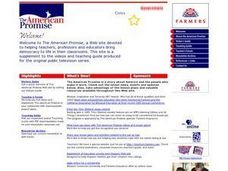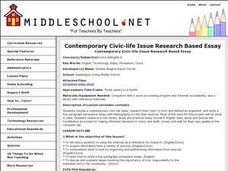C-SPAN
Make a “Deliberations” Site
Many hot button issues require deliberations, even in your classroom! Learners work in teams or as individuals to decide on a deliberation question to make into a Google site. They research the topics in depth, discuss both sides of the...
Curated OER
Is That a Fact?
Third graders listen to a paragrah as it is read and write down points that they think are important. They answer several comprehension questions to check for understanding of the passage. They then read pages in their science text book...
Curated OER
Robinson vs Barlow and the White Indians: A Trial
Young scholars judge the actions of Nathan Barlow and the White Indians by putting them on trial in the classroom. They discuss how public opinion can change based on time. Students judge the White Indians based on the early 1800's not...
Curated OER
Finding and Gathering The News
Eighth graders discover what makes an event newsworthy. They research topics by using the five W questions. They examine the difference between facts and opinions and practice interviewing people for stories.
Curated OER
Media Scrapbook
High schoolers analyze the fundamental issues relating to Canadian parliamentary democracy through the exploration of media and public opinion. A scrapbook is created containing summaries of the work performed.
Curated OER
Get the Facts on the Candidates
Students work in teams to research candidates from a current political race. They access primary and secondary resources and differentiate between fact and opinion. Students present their findings to the class in an oral report and...
Curated OER
Powers of Persuasion
Did you know that clothing and textiles can be recycled, just like glass, paper, aluminum, and plastic? Pupils are introduced to textile recycling and design persuasive posters or letters that raise awareness about this unique type of...
Newseum
Propaganda Through History: Analyzing Historical Sources
Working in teams, pairs, or individually, scholars select one resource from a gallery of historical sources and consider which examples might be considered propaganda, the techniques used to persuade audiences, and evaluate how the...
Texas Education Agency (TEA)
Mistake, Misrepresentation, and Fraud
Fraud alert! Scholars conduct research about consumer fraud and create a presentation detailing the information they find. Additionally, they research and write a report about lawsuits that resulted in large settlements.
Newseum
Persuasion Portfolios
After class members brainstorm a list of current social and political issues, groups each select a different topic from the list to research. Teams create a portfolio of at least 10 examples of stories about their issue, stories that...
Facebook
The Verification Steps
Provenance, source, date, location, and motivation. High schoolers learn how to verify the authenticity of news stories and posts by following a seven-step process. They then use the strategy to determine the original site that posted a...
Overcoming Obstacles
Listening Critically
Eschew obfuscation!! High schoolers learn techniques that permit them to listen critically, sort through verbiage used to hide meaning or mislead listeners, and determine the message's validity.
Newseum
Bias Through History: Analyzing Historical Sources
Young journalists use the E.S.C.A.P.E. (evidence, source, context, audience, purpose, and execution) strategy to evaluate historical and contemporary examples of bias in the news. The class then uses the provided discussion questions to...
Curated OER
School Newspaper
Students investigate writing a school newspaper. In this writing a school newspaper lesson, students choose topics that will be included in the school newspaper. Students view online sites about writing articles and break into groups to...
Curated OER
Wolves
Students explore wolves. In this ecology and wolves lesson, students research predator-prey relationships on the Internet and complete a related worksheet with a partner. Students interpret data on bar graphs to determine growth and...
Curated OER
An Anecdote is Worth a Thousand Pictures
Students identify anecdotes in speeches and the purposes that politicians use the anecdotes for. They create personal anecdotes for the class to hear, and students decide if the anecdote is real or fabricated.
Curated OER
Teacher of the Year
Now is the time to identify the great teachers in your school! Discuss the characteristics of persuasive writing and analyze an example. Then, each pupil chooses a teacher who they feel should be named teacher of the year. They plan and...
Curated OER
Contemporary Civic-life Issue Research Based Essay
Seventh graders write a five paragraph persuasive essay on a contemporary civic-life issue.
Curated OER
Nonfiction Text Features
Identify features of a nonfiction article in this language arts lesson. Middle schoolers apply comprehension strategies as they read the parts of the article, and analyze the author's key points. Additionally, they examine information in...
Curated OER
Active Reading with American History
Explore connections within and between informational texts with this lesson about encyclopedia articles. Middle schoolers write encyclopedia articles focusing on topics in American history. They discuss how to determine credibility...
Advocates for Human Rights
Nativism and Myths about Immigrants
Where do anti-immigrants myths come from, and how can they be refuted? Learners critically analyze media reports and how to identify reliable sources. After studying a timeline that details the history of US nativism, groups research the...
Curated OER
Where Do You Stand?
Scholars assess a government's ability to intervene in personal health decisions. They research basic facts about euthanasia and describe their opinions about new legislation passed in the United States Congress about an individual's...
Curated OER
Sounding Off About Impeachment
Help your middle and high schoolers reflect on the responsibility of newspapers to act as a vehicle for 'everyday citizens' to voice their opinions. Then, using an article about the first day of the Senate impeachment trial of President...
Curated OER
What Has Brown Done for You?
Learners review the facts of the court case Brown v. Board of Education. Next, they research recent court cases that uphold contrasting views on the landmark decision. They write opinions about these recent court cases from a 1954...
Other popular searches
- Fact Opinion Lesson Plans
- Fact and Opinion Passages
- Fact Opinion Worksheet
- Fact and Opinion Lessons
- Teaching Fact vs. Opinion
- Fact and Opinion Worksheets
- Teaching Fact and Opinion
- Fact and Opinion Games
- Reading Fact and Opinion
- Fact and Opinion Keywords
- Identifying Fact or Opinion
- Fact Opinion Quiz

























